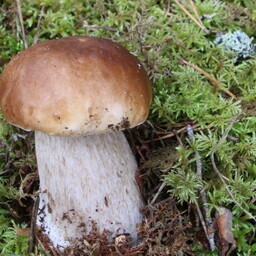Eesti Taimekasvatuse Instituudi teadur Veiko Kastanje ütleb, et metsades on lisaks varasematele seeneliikidele ka rohkem sügisseeni. Mükoloog Leho Tedersoo lisab, et metsades on
nii kukeseeni kui ka puravikke
keskmisest rohkem.
nii kukeseeni kui ka puravikke
Tõlge fraasile: nii kukeseeni kui ka puravikke
EN
both chanterelles and boletus
Tedersoo peab seda suurt seenerohkust erakordseks. Tavaliselt juuli alguses ja keskpaigas pole nii palju seeni. Kuid sel aastal on esimene suvepool olnud väga seenerikas.
Veiko Kastanje leiab eriliseks seda, et
metsast leiab just sügisseeni
. Tavaliselt neid juuli esimeses pooles ei kohta. Näiteks
männi-kivipuravikku on rohkem kui tavaliselt
.
metsast leiab just sügisseeni
Tõlge fraasile: metsast leiab just sügisseeni
EN
one can find precisely autumn mushrooms in the forest
männi-kivipuravikku on rohkem kui tavaliselt
Tõlge fraasile: männi-kivipuravikku on rohkem kui tavaliselt
EN
there are more pine boletes than usual
Tedersoo ütleb, että enamasti on Lõuna-Eesti seened varasemad. Kastanje sõnul sõltuvad seenepiirkonnad suurelt jaolt niiskusest. Viimastel aastatel on Lõuna- ja Lääne-Eesti metsades sadanud rohkem vihma kui Põhja-Eestis.
Praegu sajab piisavalt vihma ka Põhja-Eestis ja saartel. Lõuna-Eestis sajab isegi natuke rohkem kui vaja.
Tedersoo ütleb, et
viimase aja vihmahood
võivad sügisel probleeme tekitada. Märgades metsades võib puudel olla raske kasvada ja mulla hapniku puudus võib takistada seente kasvu.
viimase aja vihmahood
Tõlge fraasile: viimase aja vihmahood
EN
recent periods of rain
Ta arvab, et see ei mõjuta seeni, mis ei ole veel hakanud viljuma. Kuid tõenäoliselt kukeseeni ei pruugi sügisel nii palju olla. Sel aastal on seente varajane viljumine erakordne.
Veiko Kastanje, a researcher at the Estonian Crop Research Institute, says that in addition to earlier mushroom species, there are more autumn mushrooms in the forests. Mycologist Leho Tedersoo adds that there are more chanterelles and porcini mushrooms than average in the forests.
Tedersoo considers this abundance of mushrooms to be exceptional. Usually, there are not so many mushrooms in early and mid-July. But this year, the first half of the summer has been very rich in mushrooms.
Veiko Kastanje finds it special that autumn mushrooms are being found in the forest. Usually, they are not encountered in the first half of July. For example, there are more suillus bovinus than usual.
Tedersoo says that mushrooms in Southern Estonia are mostly earlier. According to Kastanje, mushroom areas depend largely on moisture. In recent years, Southern and Western Estonian forests have received more rainfall than Northern Estonia.
Currently, there is enough rain in Northern Estonia and the islands. In Southern Estonia, it is even raining a bit more than necessary.
Tedersoo says that the recent heavy rains may cause problems in the autumn. In wet forests, trees may struggle to grow, and the lack of oxygen in the soil may hinder mushroom growth.
He believes this will not affect mushrooms that have not yet started to fruit. However, there may not be as many chanterelles in the autumn. This year, the early fruiting of mushrooms is exceptional.

